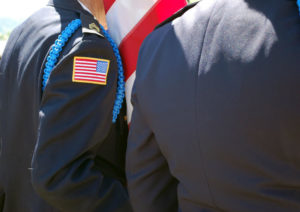In Galloway Township v. Duncan, the New Jersey Tax Court addressed when a veteran who suffers from a service-connected 100 percent permanent disability meets the legislatively imposed requirements for the personal residence tax exemption. 
The Facts of the Case
Defendant taxpayer, Lucienne Reed Duncan, M.D., sought personal residence tax exemption because of her disability. Dr. Duncan was an officer in the U.S. Air Force and a trained neurologist. Her last active duty tour was at Andrews Air Force Base in Maryland. She served as a neurologist as part of the special medical care unit. While not deployed overseas, Dr. Duncan was often the first doctor to treat patients arriving with war injuries, including serious head injuries, paralysis, and lost limbs, from Iraq or Afghanistan. She also provided medical evaluations through video link for traumatic brain injury.
After leaving the military, Dr. Duncan entered private practice. However, due to her service experiences, she was unable to continue her career as a neurologist. In 2013, she was declared to have a service-connected 100 percent permanent disability by the United States Veterans Administration.
Legal Background
The New Jersey Constitution and state law provide for tax relief for disabled veterans. Under the New Jersey Constitution:
Any citizen and resident of this State now or hereafter honorably discharged or released under honorable circumstances from active service, in time of war or other emergency as, from time to time, defined by the Legislature, in any branch of the armed forces of the United States . . . who has been or shall be declared by the United States Veterans Administration . . . to have a service connected disability, shall be entitled to such further deduction from taxation as from time-to-time may be provided by law.
Pursuant to N.J.S.A. 54:4-3.30(a), a veteran suffering a disability declared by the United States Veterans Administration as a total or 100% permanent disability sustained through military service is exempt from taxation on his or her residence. The New Jersey Legislature has defined that certain “other emergencies” establish eligibility, including Operation Enduring Freedom.
As explained by the Tax Court, for Dr. Duncan to establish eligibility for the exemption, the following criteria as established by the New Jersey Constitution and statutes must be met: (1) A citizen and resident of this State; (2) now or hereafter honorably discharged or released under honorable circumstances; (3) service in an “other emergency,” in this case Operation Enduring Freedom; (4) such service in any branch of the United States military; and (5) declared by the United States Veteran’s Administration to suffer a total or 100% permanent disability which is service connected.
The primary issue before the court was whether Dr. Duncan’s service constitutes an “other emergency” given that she was not physically present on the battlefield during one of the defined military conflicts.
The Court’s Decision
The New Jersey Tax Court determined that Dr. Duncan was entitled to tax-exempt status. The court first concluded that Dr. Duncan’s service at Andrews Air Force Base was in a theater of operation of Operation Enduring Freedom. In reaching its decision, the court highlighted that Operation Enduring Freedom is commonly referred to as the Global War on Terrorism, and that there is more than one theater of operation.
The Tax Court also found that Dr. Duncan’s service constitutes “direct support,” as required by legislation governing the criteria that qualifies for participation in an “other emergency.” As the opinion explains:
Dr. Duncan’s treatment of the torn limbs, traumatic brain injuries and other injuries directly resulting from war renders her service as “direct support.” The fact that she was in a permanent facility in the United States, instead of some medical tent in a war zone in Iraq, does not minimize the “direct support” she provided in treating severely wounded soldiers of battle. Moreover, the distance of her stationed facility did not diminish the severity of torn limbs and other injuries she treated such that her service was not an experience of war.
For more information about the New Jersey Tax Court’s decision or the legal issues involved, we encourage you to contact a member of Scarinci Hollenbeck’s Government Law Group.
